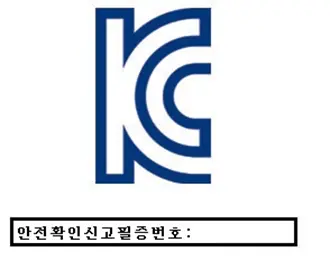
What is the KC Korea Certification Mark?
The KC (Korea Certification) mark is primarily aimed at electrical and electronic products, household goods, and children's products. According to Korea's "Electrical Appliances and Household Goods Safety Management Act," electrical products manufactuRED or sold in the Korean market must apply for and obtain the relevant safety certification from a certification body based on their model before release (for domestically manufactured products) or before customs clearance (for imported products).

kc certificate Validity Period
1. Mandatory safety certification
2. Self-regULatory safety confirmation: 5 years
3. Supplier's self-confirmation: No certificate, confirmation is permanently valid
Factory Inspection Requirements
Mandatory safety certification requires an initial factory inspection and annual audits. The certificate holder must be the factory for mandatory safety certification. For the other two types of certification, the certificate holder can be the factory, manufacturer, or importer.
kc certification Categories
KC certification is mainly divided into "KC Safety" and "KC EMC."
KC Safety
The new "Electrical Appliances Safety Management Act" classifies KC Safety certification into three categories based on the product's hazard level:
1. Safety Certification
2. Self-regulatory Safety Confirmation
3. Supplier's Declaration of Conformity (sdoc)
KC EMC
In the field of electromagnetic compatibility (EMC), certification is implemented under the broadcasting communication equipment conformity assessment system (referred to as emc certification) and is divided into:
1. EMC Conformity Certification
2. Conformity Registration
3. Temporary Certification
KC Certification FAQs
For the same product (same model), can KC Safety and KCC/emc certificates be applied for separately by the factory and importer? Must the applicants for KC Safety and KCC/EMC certificates be the same? How does this affect product clearance later?
Korean Agency Response:
For the same product, the KC Safety and KCC/EMC certificates can be held separately by the factory and importer. The holders of the two certificates can be different. For example, the factory can hold the Safety KC certificate, and the importer can hold the KCC/EMC certificate, or vice versa. However, if the importer holds the certificate, it is only valid for that importer. If the factory needs to add a new importer later, a new KC Safety or KCC/EMC certificate must be issued for the new importer. Note: If both certificates are held by Korean importers, the applicant must be the same for both.
Required Documents for KC Certification
1. Application form for electrical product safety certification (mandatory)
2. Application form and declaration for self-regulatory safety confirmation (self-regulatory)
3. List of components affecting safety directly
4. Electrical circuit diagram
5. Detailed transformer specifications (for relevant products)
6. Insulation material list (temperature, voltage resistance, or flammability rating)
7. Product manual (including Korean product manual)
8. Marking label
9. Authorization letter for the agent (mandatory; required if the agent applies)
10. Questionnaire (only for mandatory certification)
Other Considerations for KC Certification
1. When using cb certification and report, ensure consistency: applicant, product name and model, and test standards must match the KC standards version, and the CB report must be valid within 3 years.
2. Korea's voltage and frequency: Single-phase 110V, 220V~, three-phase 220V, 380V, 60Hz or 50/60Hz (not applicable: 230V 50Hz or 220V 50Hz).
3. Plugs and power cords used must comply with Korean regulations.
4. Other compliance requirements.
Email:hello@jjrlab.com
Write your message here and send it to us
 2026 EU SVHC Candidate List (253 Substances)
2026 EU SVHC Candidate List (253 Substances)
 LFGB Certification Cost and Timeline Guide
LFGB Certification Cost and Timeline Guide
 Bluetooth FCC Test Report
Bluetooth FCC Test Report
 Is FCC Testing Required?
Is FCC Testing Required?
 Where to Find FCC Test Reports
Where to Find FCC Test Reports
 LFGB Compliance Testing for Plastic Food Contact M
LFGB Compliance Testing for Plastic Food Contact M
 How to get LFGB Compliance Report for Food Grade P
How to get LFGB Compliance Report for Food Grade P
 LFGB Certification Process for Kitchenware Product
LFGB Certification Process for Kitchenware Product
Leave us a message
24-hour online customer service at any time to respond, so that you worry!




